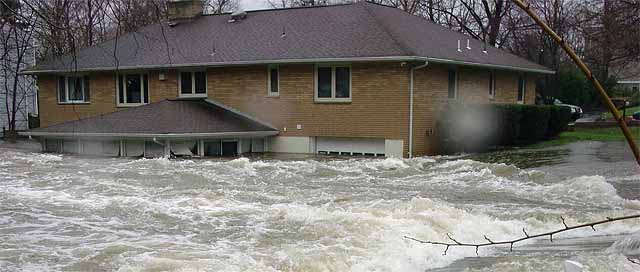Flood Preparedness | 4 Things You Should Do


Flood Preparedness is a topic that applies to a huge number of people. Flooding can destroy tremendous amounts of agriculture and it can damage or destroy homes (and lives).
According the American Red Cross, and others, “Floods are among the most Frequent and Costly natural disasters.”
Floods and Flash Flooding are natural disasters that will strike in deserts, rain forests, populated areas, rural areas, mountains, valleys… It’s pretty much possible anywhere.
A flood can result from heavy or prolonged rain, melting snow, ice jams, storm surge, coastal storms, dam overflows, and other water systems.
Flooding can be slow, or a Flash Flood can occur suddenly due to rapidly rising water along a stream or low-lying area.
Flash floods are especially dangerous because they may happen without warning. In just a few minutes roaring water carrying debris – even boulders – can sweep away most things in their path.
Small streams, creeks, culverts, or even dry stream-beds that appear harmless in dry weather can flood. And it can happen fast.
Flood Preparedness
These are the four things you should do:
1. Know your area history
2. Be prepared to evacuate
3. Stay safe with these Flood Preparedness Tips
4. Flood insurance
Flood History of Your Area
If you already live in a flood zone or floodplain, know (research) the flooding history of your area.
Find out how often they happen where you live. And then prepare accordingly.
Here’s a online tool where you can enter your address to discover your flood risk: Flood Map Service Center
If you are located in an area that is susceptible to flooding (or even if you don’t), you should have a NOAA Weather Radio with tone alert for watches and warnings.
Continue reading: Best Weather Alert Radio – Which One Should I Get?
Be Prepared to Evacuate
You don’t want to mess around with flood waters! Water is LOTS more powerful than you may think.
6 to 12 inches of water on the road will likely float your vehicle. Now it’s too late to get out, evacuate.
You should do 2 things, and figure this out ahead of time:
1. Decide WHERE you would go.
2. Decide the ROUTE to get there.
Maybe a hotel out of the flood zone. Or family or friends home. Know a route that DOES NOT go throw low lying flood-prone areas.
Read more: Time to Evacuate – But Where Will You Go?
Flood Preparedness Tips for Staying Safe
Do you have an emergency kit in your vehicle? You should!
Continue reading: 10 Essential Items in a Emergency Kit
Survival Gear for Preparedness | What You Need and Why
Turn off utilities in your home. Know how to do it. At least unplug your appliances and devices before you leave. Whatever you do, don’t use gas or electrical appliances that have been flooded.
1st floor and basement items may become damaged or entirely ruined. If you have time, move valuables and furniture that you hope to save, to higher floors of the home.
Avoid contact with floodwater. Why? Because it may be contaminated with sewage.
Flood waters may contain dangerous insects or animals. Watch out for snakes in areas that were flooded. Flood waters flush snakes from their homes.
Drinking water: It’s safest to boil your tap water for drinking until it has been declared safe. A quality drinking water filter will provide assurance of safe drinking water.
Travel Berkey Water Purification
(Berkey Review)
Food: If any food has come into contact with flood water, dispose of it.
If you’re out hiking or camping, particularly in areas that are not very familiar to you, be sure you understand the risks in your area. A torrential thunderstorm 20 miles away could result in a torrential flash flood where you are, on a nice sunny warm day…
What about flood insurance?
Standard homeowners insurance does not cover flooding. But flood insurance does. You can find more information at FloodSmart.gov.
You can get flood insurance through private insurance agents. They get it underwritten through the National Flood Insurance Program
Even people living in high-risk areas have access to flood insurance. To get a mortgage to buy a home in certain FEMA designated flood zones will require you to purchase flood insurance.
Apparently, about one-quarter of flood damage claims come from areas that were not considered at high risk for floods. So, you may want to think seriously about flood insurance if you are at risk. Regular homeowners insurance policies don’t cover it.
Read more: Homeowners Insurance Inventory – Here’s What To Do
In summary regarding natural disasters, FLOODING is very likely overall.
It can be completely devastating when it hits. Consider your vulnerability where you live. Have a plan in case it happens. Consider flood insurance protection.
Continue reading: A Hurricane Preparedness List
